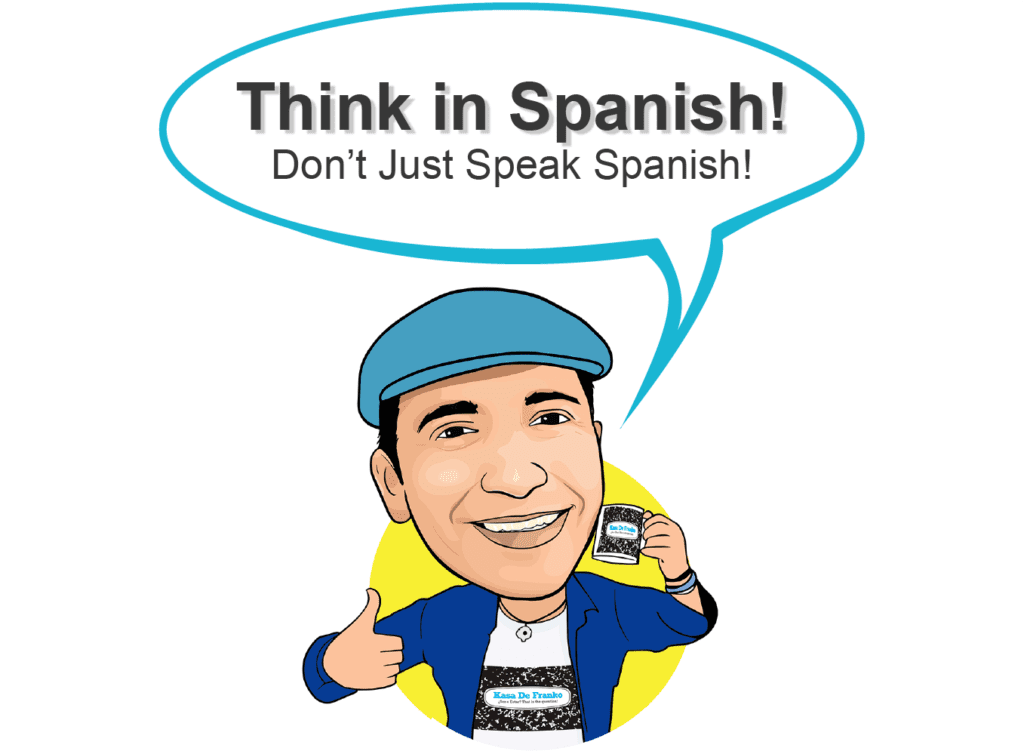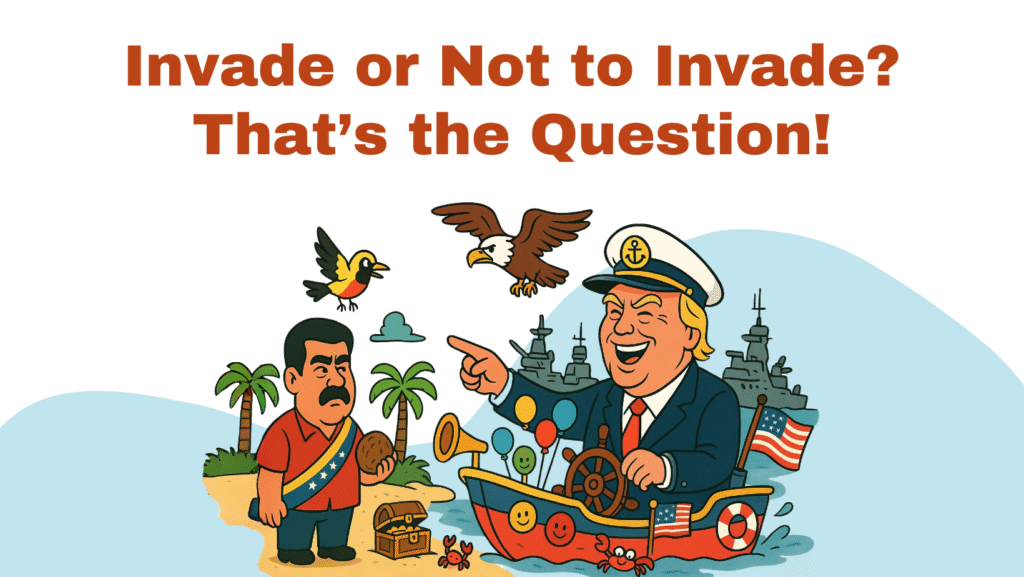
Why’d the US Invade Venezuela? Trump Swag!
Welcome to another chaotic edition of Kasa de Franko’s geopolitical soap operas. Today, we’re diving into a drama that makes Narcos look like a school play: Trump, Venezuela, and the eternal question—should the US invade, or just keep tweeting?
Sounds like a Netflix plot? You bet. But it’s all real, folks. And like any KDF story, there’s more drama, irony, and coffee-fueled sarcasm than you can handle.
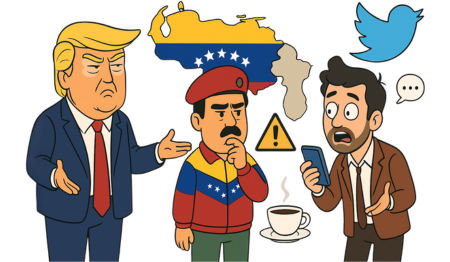
Get Ready for the Geopolitical Soap Opera
Grab your seat, get your coffee (or your beer), strap in, and forget Netflix. Today, Kasa de Franko takes you on a wild ride through the Venezuelan drama featuring Trump, Maduro, and a cast of international extras who all seem to have wandered onto the wrong set.
This is where politics meets reality TV, where headlines scream louder than facts, and irony is practically mandatory.
So, why would the US invade Venezuela?
Like every soap opera worth its name, you can’t start without the lead actors. Enter Trump and Maduro.
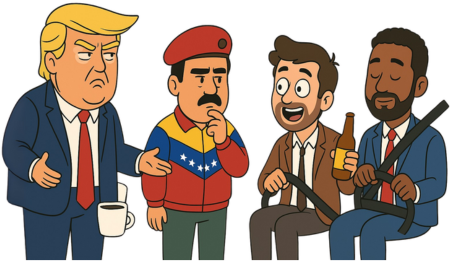
Trump, Maduro, & the International Stage of Chaos
Trump’s midnight tweets, Maduro’s endless speeches, and the media’s obsession collide in what feels like an international stage of chaos. Picture Trump in Florida, hair doing its own choreography, promising “serious consequences.”
Meanwhile, Maduro clings to power in Caracas, blaming everyone but himself. Together they’ve turned geopolitics into a soap opera that nobody wanted—yet somehow we’re all forced to watch. And the big question still hangs in the air: why would the US invade Venezuela?
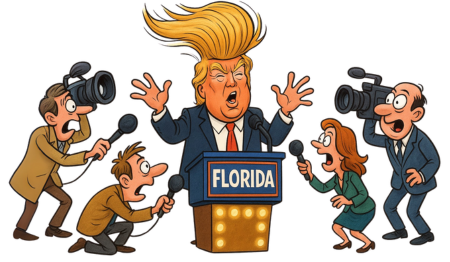
A Little Pussy in Miraflores!
On the other side, Maduro lounges like a pussy who knows it owns the furniture. Slow blinks, fingers drumming on a polished desk, occasionally waving at invisible cameras as if the world’s attention is a private TV show curated just for him. He doesn’t just govern—he performs governance, turning bureaucracy into a spectacle.
Instead of roaring back at Washington, he curls tighter on the sofa, purring at the absurdity of it all. But somehow….The Question Remains:
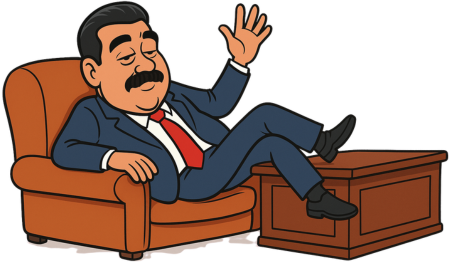
Would Trump Really Invade Venezuela?
If Miraflores Palace is the stage, Maduro is the cat curled on the velvet sofa, purring while chaos roars outside. Ministers stumble through press conferences, opposition leaders rehearse outrage, and foreign diplomats send memos that sound more like bad script notes than policy.
And like every over-the-top soap opera, there’s always a cliffhanger. The U.S. invasion rumor isn’t delivered as a military plan — it drifts in like a narrator’s voice, dangling suspense but never delivering the climax.

What About the World?
Meanwhile, the international extras mill around in the background, each with their own motivations, all equally theatrical:
- China sips tea quietly in the corner, calculating, waiting, ensuring business is never interrupted by ideology. The subtlety of a poker-faced investor, they watch the drama unfold without spilling a drop.
- Russia sharpens its pencils like a bored chess master, plotting moves that could disrupt the board entirely. Their presence is a reminder: any misstep is a global ripple, and Venezuela is just one pawn in a much larger strategy.
- Europe types up press releases with fancy words that ultimately mean nothing. Diplomatic language dances across paper, promising nothing actionable, providing a soundtrack of polite sighs while the world burns.
While Europe’s foreign ministers debate over pastries, China’s mandarins send carefully worded emojis, and Latin American neighbors shake their heads in disbelief, the question still dominates the headlines: why would the US invade Venezuela?”
But while the world enjoys the show, not everyone has the luxury of popcorn. Behind the Headlines:

The Reality They Don’t Show You
And yes, all of this is happening in reality. No Netflix CGI, no dramatic scriptwriter. This is real life, where personalities clash, policies collide, and headlines scream louder than facts. The stage is set, the players are in position, and the audience—whether policymakers, citizens, or the media—can only watch, bewildered, as geopolitics unfolds like a darkly comedic theater production.
Yet while the world obsesses over gestures, tweets, and press releases, the real story is playing out on the ground—where lives are at stake, and the drama is painfully real.
While headlines scream and cameras flash, the real stakes are quietly stacking up on the streets of Venezuela. Every glance, every gesture, every statement is a signal. Every tweet is a headline. Every international meeting, a suspenseful cliffhanger
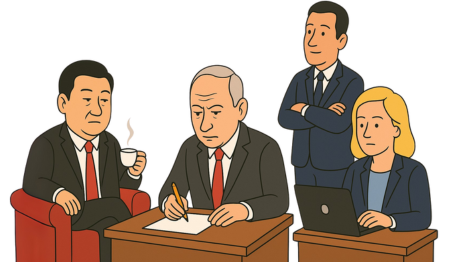
The Show Must Continue
For the Venezuelan people, it’s less theater, more survival drama: food shortages, economic collapse, and uncertainty are the unscripted elements that make this political soap opera painfully real.
The spectacle is enormous, the stakes sky-high, but the outcomes? Anyone’s guess. Think of it as a reality show with global consequences—and no commercial breaks.
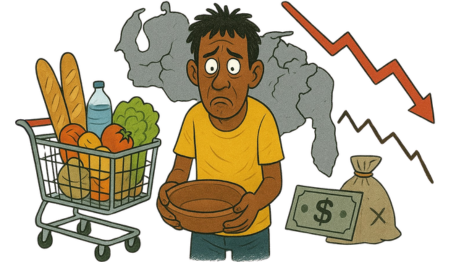
History Wrote the Script
Here’s the kicker: today’s cast might feel improvisational, but the stage has been carefully set over centuries. The recurring mix of intervention, spectacle, and the thin line between “helpful neighbor” and meddling overlord isn’t new—it’s practically tradition.
Cue the historical guest stars: Monroe, Roosevelt, and a parade of doctrines and corollaries that essentially said: “We’ll take the stage, whether you like it or not.” Today’s headlines? Just the latest act in a centuries-long political soap opera, where the scripts are recycled, the props get fancier, and the audience is perpetually confused—but always entertained.
Let’s get that historical context to understand the present:

Monroe, Roosevelt, & the Art of Meddling
Imagine it: it’s 1823, and President James Monroe sits in a chair that creaks under the weight of early-19th-century diplomacy. He’s staring at Europe through the lens of an early American paranoia filter.
The Monroe Doctrine drops like a mic: “Europe, hands off our backyard.” Translation for those who missed the memo: “Latin America belongs to us. Deal with it.” Diplomatic? Sure. Subtle? Not really. More like a political sledgehammer wrapped in a velvet glove.
Fast-forward eighty years, and enter Theodore Roosevelt, the man who believed Uncle Sam was basically the world’s bouncer. The Roosevelt Corollary of 1904 wasn’t just a policy—it was a stage direction: “If our neighbors can’t handle their business, we get to step in.” Cue the interventions, coups, and the inevitable confusion over who’s hero and who’s villain.
Think of it like a soap opera where the main character insists he’s the moral compass, but somehow every episode ends with someone’s mansion getting bombed or their banana plantations nationalized.
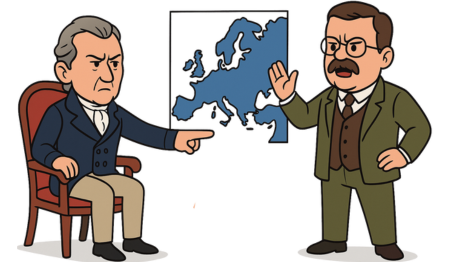
A Quick Tour of Historical Highlights
- Mexico, 1846-1916: America swings by multiple times for varying “reasons.” Spoiler alert: it often had to do with control, resources, and the occasional moralizing about democracy.
- Cuba, 1898-1961: From the Spanish-American War to the Bay of Pigs, the US has a habit of “liberating” the island with style, fireworks, and, occasionally, bullets.
- Dominican Republic, 1916-1965: Uncle Sam’s extended vacation included occupation, political reforms, and reminders that sometimes help comes with a side of tanks.
- Grenada, 1983: A tiny island, a big invasion, and a media circus that reminded the world: America likes dramatic entrances.
- Panama, 1989: A quick stroll through, overthrowing a dictator, and leaving behind a trail of chaos like confetti after a very aggressive parade.
The pattern is clear: talk freedom, shout democracy, but check the real motives—bananas, sugar, oil, and strategic dominance. Venezuela? Just the latest star in this long-running soap opera.
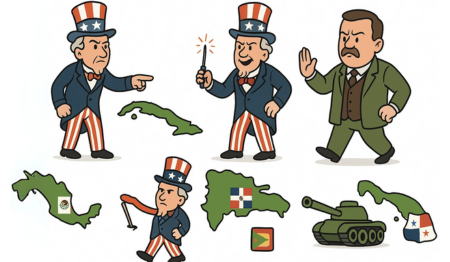
Cold War: Venezuela in the Tropical Spotlight
Move into the 1950s-1980s, and Venezuela becomes a tropical chessboard, with elections, oil, and a looming fear of communism. Washington, still scarred by Cuba’s bold moves, watches like a hawk—or maybe more like an overly suspicious aunt at a family reunion, suspicious of anyone who smiles too much.
Venezuela wasn’t Cuba, but with oil as the prize, who cares about subtle distinctions? Every election, protest, or social reform is analyzed like a plot twist in a telenovela.
During this period, Washington’s paranoia dictated foreign policy, and Venezuela’s oil wealth made it both a prized neighbor and a potential threat. Every election, every protest, every minor social reform was viewed through the lens of Cold War fears. The stakes were high: control the oil, control the narrative.

Enter the Extra-Half Man: Chávez in 1999
Chávez: The Telenovela Firebrand: Hugo Chávez was a master of political theater. Half Robin Hood, half firebrand, half dictator-in-training (yes, three halves, because Chávez was extra like that). He could fill a stadium with charisma, deliver eight-hour speeches that doubled as performance art, and make anti-imperialist rhetoric look like an Olympic sport. Every eyebrow raise, every pointed finger, every staged confrontation with the US was carefully calibrated to create drama and capture the audience.
Chávez didn’t just govern; he performed governance. His life was a telenovela, and the Venezuelan people were the unwitting viewers. Scandals became subplots. Policy announcements became headline-worthy episodes. Even his hand-picked successor, Nicolás Maduro, inherited not just the presidency, but an entire theatrical framework in which politics and spectacle were inseparable.
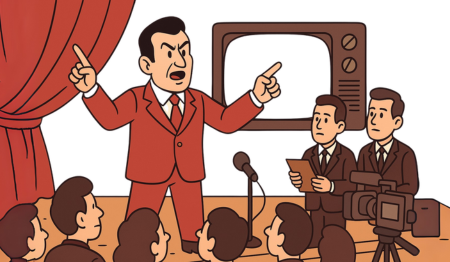
Trump: The Reality Show Magnate
Donald Trump, on the other hand, took political theater to a very different stage: reality TV. Tweets at midnight, hand gestures that defied physics, and rallies that felt like live auditions for “The Apprentice: World Edition.” Trump’s charisma was different from Chávez’s—it was brash, flashy, and designed for instant media virality. Where Chávez built telenovelas, Trump built memes, soundbites, and endless headlines.
Even as the world spins from the chaos, one question quietly bubbles beneath the spectacle: why would the US invade Venezuela? It’s the kind of rhetorical flourish that belongs perfectly in Trump’s reality-show universe — dramatic, ironic, and entirely headline-worthy.

Opposite Poles, Same Drama: Chávez vs. Trump
Chávez and Trump might sit on opposite ends of the political spectrum—one a socialist revolutionary, the other a capitalist mogul—but when it comes to political theater, they’re surprisingly twins separated at birth. Chávez filled stadiums with charisma and delivered eight-hour speeches like they were concerts; Trump filled arenas with hand gestures and tweets like a one-man Broadway show. One spoke of anti-imperialism, the other of winning big; yet both understood the art of spectacle, turning policy into headline-worthy entertainment.
Both could dominate the narrative, command attention, and make their audiences laugh, gasp, and occasionally cringe. Chávez staged international confrontations like a telenovela plot twist, while Trump staged press conferences like reality-TV cliffhangers. Despite ideology, both leaders treated politics as performance, and the world, willing or not, had a front-row seat.
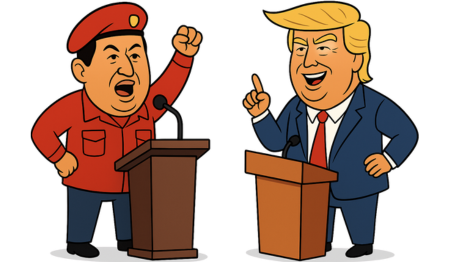
When Opposites Kiss: The Curious Similarity
As the saying goes: opposite poles attract. Chávez and Trump, ideological antipodes though they were, shared a love for spectacle, drama, and dominating the media cycle. If politics were a dance floor, they’d both be doing the same tango—one with socialist flair, the other with capitalist pizzazz. Headlines? Guaranteed. Memes? Unavoidable. International bafflement? Absolutely.
In short, the lesson is clear: you can be completely opposite in philosophy, yet equally committed to commanding attention. For Chávez and Trump, governance wasn’t just policy—it was theater, and their audiences were always left watching, bewildered, and slightly entertained.
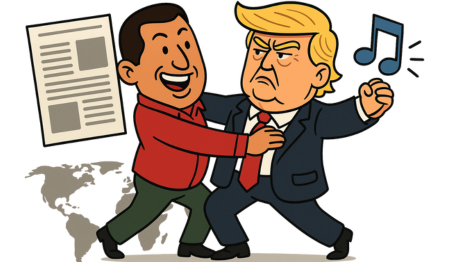
From Chávez’s Stage to Maduro’s Shadows
Chávez may have perfected the telenovela of politics, and Trump the reality-TV spectacle, but the story didn’t end with them. Enter Nicolás Maduro, Chávez’s hand-picked successor, inheriting not only the presidency but the complex stage Chávez had built. Maduro doesn’t fill stadiums or dominate global headlines like his predecessor or the American magnate; instead, he maneuvers in the shadows, where policy, survival, and power plays intersect.

Maduro: Godfather of Cartel de los Soles
From Washington’s perspective, Maduro is less a president and more the alleged godfather of the Cartel de los Soles. Accusations fly: using the military to traffic cocaine with the FARC, running a narco-network, dangling multi-million-dollar bounties like some real-life video game boss. Reality?
Messy, opaque, and tangled in intelligence reports, propaganda, and political theater. It’s a story the media loves to tell, complete with villainous snapshots for headlines, but the truth on the ground is far more complicated.

El Chapo, El Mayo, & Maduro el Facilitador
Even infamous narcos like Joaquín “El Chapo” Guzmán and Ismael “El Mayo” Zambada allegedly saw Maduro as a facilitator of drug operations. Sounds dramatic, right? Like something straight out of a Netflix crime saga. Believing that is like trusting a gossip columnist to fact-check your Tinder date’s résumé.
In the corner of a dimly lit room, El Mayo spins a globe with one finger, smirks at the news ticker, and dryly remarks to his crew: “why would the US invade Venezuela?” The absurdity hangs in the air — Trump’s rhetoric blasting headlines, Maduro supposedly pulling strings, and here’s a capo shrugging like it’s just another Tuesday.
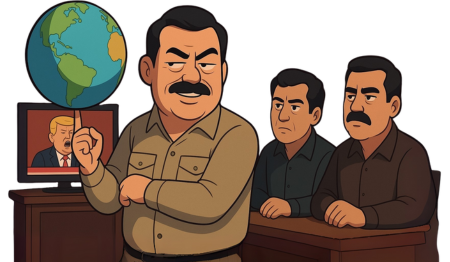
Media Frenzy vs. Reality
The media loves the story: a president secretly orchestrating every cartel move. Headlines scream narco-states, sanctions, and international outrage. Reality? Far messier. Truth gets tangled in politics, intelligence leaks, and local corruption.
While Maduro certainly governs in ways that benefit some powerful allies, painting him as the mastermind behind every single drug shipment oversimplifies a chaotic system — making him seem smarter than he actually is.
In short, the narrative is perfect for memes and headlines, but Venezuelans live a reality far more tangled, where political survival, state institutions, and illicit networks intersect in ways that no single villain can fully control.
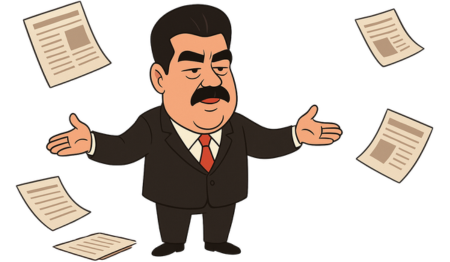
Tren de Aragua: The Chaos Crew
Now let’s talk about Tren de Aragua. Born in the grim confines of Venezuelan prisons, this gang spread across Latin America like wildfire. The US media often frames this expansion as “state-backed narco-terrorism,” implying Maduro orchestrates their every move. Reality check: Tren de Aragua is a criminal enterprise thriving on opportunity, corruption, and chaos, not a puppet performing on Maduro’s political stage. However, everything is possible and closer connections between Maduro and el Tren de Aragua cannot be completely dismissed.
They exploit weaknesses in governance, economic collapse, and the gaps left by decades of political theater. Violence, extortion, and trafficking are their tools, and survival—not ideology—is their agenda. While their rise overlaps with the Chávez-Maduro era, they act independently, opportunistically, and often unpredictably.
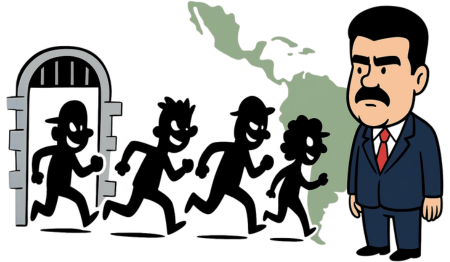
Putting It Together
The narco world in Venezuela is messy. Alleged ties between Maduro and legendary drug lords grab headlines, while gangs like Tren de Aragua operate in the shadows, mostly ignoring politics unless it serves them. At a recent (totally hypothetical) meeting, El Koki, the infamous leader, leans back, smirks, and mutters: “why would the US invade Venezuela?”
This mix of telenovela drama and real-life crime keeps journalists, analysts, and the world both entertained and horrified
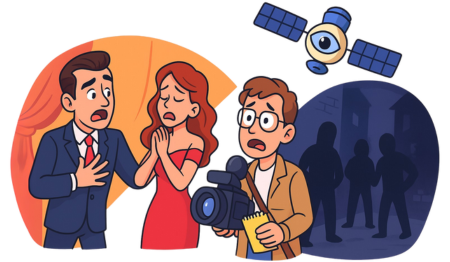
US Arguments Against Maduro
From Washington’s perspective, Nicolás Maduro isn’t a president; he’s the alleged godfather of the Cartel de los Soles, a narcotics empire with military endorsements. The US accuses him of using the Venezuelan army to traffic cocaine with the FARC, running a narco network, and even dangling multi-million-dollar bounties like a real-life video game boss.
The twist? Much of this is based on intelligence reports that aren’t fully public. It’s propaganda, politics, and secrecy mixed into a cocktail best served cold. This narrative paints Maduro as a villain straight out of a Netflix series, perfect for media headlines but messy on the ground.
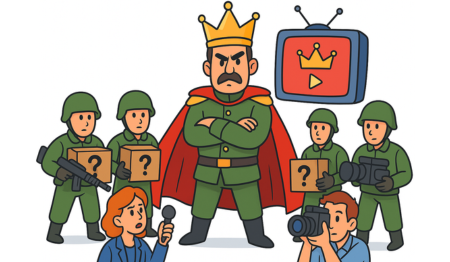
Guaidó: The Twitter President
2019 brought Juan Guaidó into the scene, recognized by the US as “interim president.” Reality? He controlled zilch. The failed uprising on April 30th proved it. By 2023, he lost the title officially. Lesson learned: international recognition doesn’t equal domestic power, and Twitter clout is not governance. Yet, for a brief moment, he became the star of a diplomatic experiment that played out live on social media, complete with memes, hashtags, and global commentary.
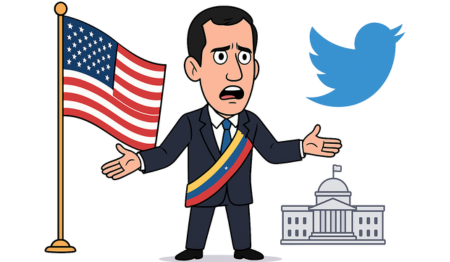
Drug Routes: The Pacific Overshadow
Plot twist: 84% of the drugs entering the US do so via the Pacific, mainly Mexico. The Caribbean, including Venezuela, is a minor route. So, why the focus? Politics over logistics, media over maps. Invading Venezuela for drugs? It’s like declaring war on Norway to stop movie piracy in Russia. The narrative makes headlines; the reality is less exciting but far more strategic.
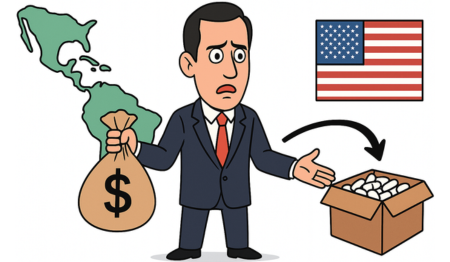
US Considerations: Cost, Politics, & Reality
An invasion of Venezuela wouldn’t be Panama 1989 redux. The terrain is treacherous, the population resilient, and the army familiar with guerrilla tactics. Lessons from Iraq 2003 serve as cautionary tales: quick promises, long-term disasters. Politically, Latin American nations may unite in opposition, while China and Russia are not mere spectators.
Trump’s goal is simpler: media spectacle and domestic political gain. Threaten from the podium, win points in Florida, avoid boots on the ground — and somewhere between the tweets and the hair-flips, you can’t help but ask: why would the US invade Venezuela? Classic rhetoric over reality.
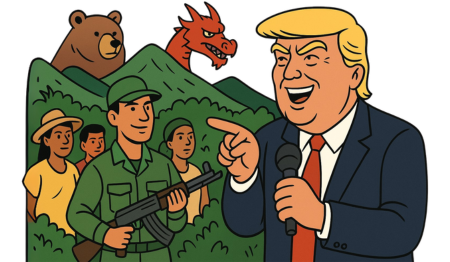
Economics & Oil: The Hidden Agenda
Venezuela’s true prize is oil. The largest proven reserves on the planet, locked in a country with infrastructure in decline. US sanctions on PDVSA and officials aimed to squeeze Maduro financially. Consequences? Production collapsed, citizens suffered, and Russia and China moved in, offering loans, technology, and deals. Oil, not cocaine, is the real game.
Sanctions had unforeseen ripple effects. China gained dominance over loans, Russia got strategic positions in the Faja del Orinoco, and Iran stepped in with gasoline and technicians. Attempting to isolate Maduro backfired, highlighting the complex chessboard of global energy politics.
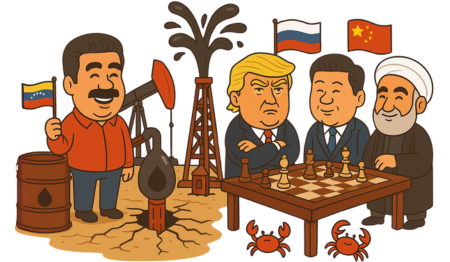
Geopolitics: China & Russia Step In
China’s message is simple: “Hands off, business first.” Diplomats sip tea, adjust ties, and calculate which oil deals survive the chaos. Every move is measured, every word choreographed — the global markets are their chessboard, and Venezuela is just another pawn.
Meanwhile, Putin lounges in Moscow, vodka in hand, watching Trump’s hair defy gravity and his tweets spiral into late-night theater. Smirking at the spectacle, he mutters to his aides, “why would the US invade Venezuela?” The irony is delicious, and the world watches, popcorn in hand, as this geopolitical soap opera unfolds.
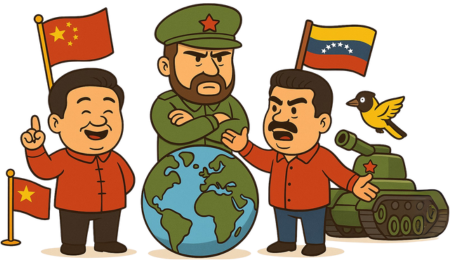
Human Cost: The Reality Behind the Headlines
Amidst political theater and media spectacle, the Venezuelan people bear the brunt. Citizens navigate shortages, economic collapse, and uncertainty while being pawns in a geopolitical chess match. Every headline, threat, or tweet impacts their daily lives. This human element is the silent narrative often overshadowed by dramatic coverage.

Media Narratives vs Reality
The story the world sees is sensational, selective, and simplified. Narco accusations, political threats, and media spin create a version of reality that entertains more than it informs. Separating narrative from fact requires skepticism, context, and a recognition that international politics is rarely clean, fair, or logical.
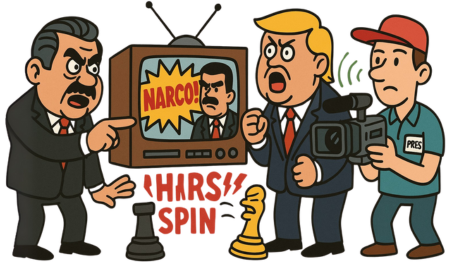
The Soap Opera Continues
Will the US invade? Likely not. But the rhetoric, sanctions, and strategic maneuvers reveal the motivations: oil, votes, and media attention. The story is complex, layered, and full of irony. Maduro is no saint; Trump is no strategist; the international community is a mix of opportunists and cautious observers. And the Venezuelan people? Stuck watching a live-action telenovela, starring themselves without consent.
In the end, this isn’t a story with neat endings. It’s a Kafkaesque drama with global stakes, ironic plot twists, and a dash of dark comedy.
Pour yourself another coffee (or beer), read the headlines, and remember: in Kasa de Franko’s world, truth is messy, narratives are endless, and the drama never sleeps — and somewhere in all this chaos, you’re left asking: why would the US invade Venezuela?
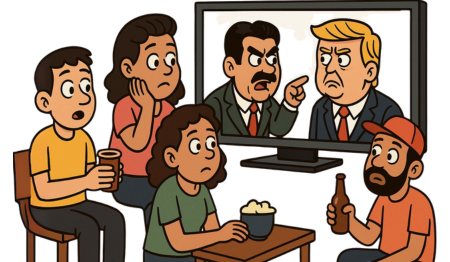
Spanish: Your Pass to Latin America’s Drama & Beyond
Amidst all the geopolitical chaos, one thing becomes crystal clear: the world is interconnected. News, politics, and culture cross borders at the speed of a viral tweet, and suddenly you’re left wondering: why would the US invade Venezuela? Headlines swing from “freedom and democracy” to “hold my beer, we might invade,” and if you don’t speak the language, half the story slips past you.
To really get what’s going on, you need more than translations—you need Spanish. It’s not just a language; it’s your backstage pass to Latin America’s drama and beyond.
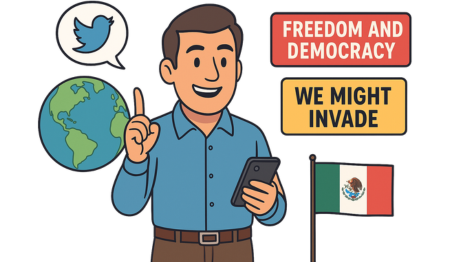
Spanish as Your Decoder for Global Chaos
Spanish opens doors to Latin America, Spain, and global media. From analyzing political discourse in real time to understanding local perspectives without relying on headlines, knowing the language lets you catch nuance, irony, and context that translation often misses. In a world where narratives are crafted faster than reality itself, Spanish gives you an edge.
Without Spanish, headlines scream why would the US invade Venezuela? — but you’d miss the irony, context, and hidden meaning.
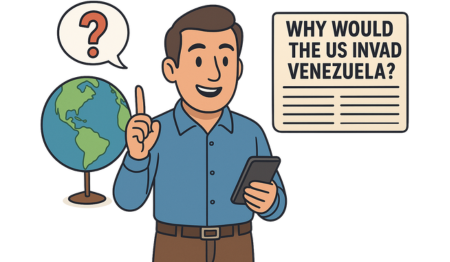
Because Google Translate Won’t Save You
At Kasa de Franko, we help you do just that. Whether you want to follow Latin American news, engage with cultural content, or dive into politics without the filter of English media, our lessons combine immersive conversation, cultural insights, and humor—because language learning should never feel like homework. Think of it as decoding global chaos… but with coffee in hand.
Ready to turn current events into a language adventure? Check out our other KDF articles and see how Spanish can make you a sharper, more informed global citizen—while still having fun along the way.
